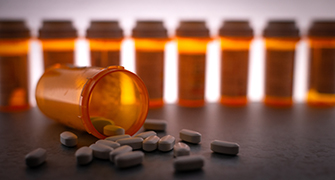Opioid Use Disorder is a progressive, chronic condition that can cause damage to families, lives, and loved ones. Opioids are a class of drugs that include the illegal drug heroin, synthetic opioids such as fentanyl, and pain relievers available legally by prescription, such as oxycodone (OxyContin®), hydrocodone (Vicodin®), codeine, morphine, and many others. Addiction is a complex condition, however, there are three things that everyone should know about it. Keep reading to learn more about the signs and symptoms of opioids addiction, how it is related to mental health, and how to get help for opioids addiction.
Opioids Addiction: Know the Signs and Symptoms
If you suspect that a loved one is suffering from addiction to opioids, there are a few tell-tale signs you can look out for. Opioid use disorder can be diagnosed by a doctor. However, addiction can look different for everybody, and signs and symptoms can vary from person to person. Some individuals struggling with opioid use disorder may not display symptoms right away and can suffer in secrecy for a long time. For others, their loved ones are able to notice signs and symptoms very quickly.
Signs of opioid abuse include:
- Uncontrollable cravings
- Drowsiness
- Changes in sleep habits
- Weight loss
- Frequent flu-like symptoms
- Decreased libido
- Lack of hygiene
- Changes in exercise habits
- Isolation from family or friends
- Stealing from family, friends, or businesses
- New financial difficulties
Opioids Addiction and Mental Health
Another important aspect of opioids addiction is how it is directly related to mental health. Three important phrases to know regarding opioids addiction and mental health include underlying cause, co-occurring disorder, and dual diagnosis.
- Underlying cause. Addiction is not a standalone condition. It is always the symptom of a larger issue, which is known as the underlying cause. Underlying causes of addiction can include trauma, sexual and gender issues, self-esteem issues, and mental health conditions. Underlying causes can be diagnosed, or they might be undiagnosed and discovered later in treatment.
- Co-Occurring disorder. Co-Occurring disorders (link to co-occurring disorders page) are conditions that take place alongside addiction, such as anxiety, depression, post-traumatic stress disorder, and much more. Co-Occurring disorders directly impact each other, fuel each other, and create a vicious cycle.
- Dual Diagnosis. In order to successfully overcome both the addiction and the co-occurring disorder or underlying cause, they need to be treated together at the same time. This is called dual diagnosis.
Self-Medicating
Many individuals who become addicted to opioids are self-medicating. Whether it is their mental health conditions or their physical pains, they start taking more medication than originally prescribed. They may find that they feel better when they take more and more opioids, however, this feeling is temporary and actually makes conditions worse.
A side effect of addiction is heightened anxiety and depression, so an individual who is suffering from these conditions can make them worse through opioid use. In addition, physical pain can become worse through opioid abuse due to the damage that happens to the pain receptors.
How to Get Help for Opioids Addiction
The most important thing to know about opioids addiction is how to get help. Opioid abuse is chronic. When left untreated, it will lead to overdose and death.
- Talk to a loved one. Whether you are the one suffering from opioid addiction or if it is a loved one in your life, having this conversation will save a life. If talking face-to-face is difficult, you can write an email, letter, or text message.
- Make the call. If you do not have a loved one in your life to help you, or you do not feel comfortable reaching out to them, give us a call and we will help you. Our admissions team is standing by at all hours to answer any questions you may have regarding treatment, logistics for entering treatment, and what the process is like.
About The Pointe Malibu Recovery Center
You do not have to suffer from opioid addiction any longer. Even if you suffer from chronic pain, you can live a healthy, fruitful life outside of opioid addiction. The Pointe Malibu Recovery Centers’ highly trained and experienced physicians, nursing staff, and clinicians guide our clients through the medical detox and stabilization process, all the way through to the end of the treatment stay.
Our medical team works closely with each client to minimize the acute physical symptoms of withdrawal associated with stopping drug and/or alcohol use. Nursing care and Incidental Medical Services (IMS) are available around the clock to monitor clients’ status, provide relief from withdrawal symptoms, and ensure clients’ safety. Our medical approach utilizes medications to reduce the severity of withdrawal symptoms and vastly diminishes any risk of life-threatening dangers during stabilization.
After stabilization, you will be ready to receive counseling — one-on-one, group, and family sessions — so that you can learn the tools needed to stay sober and treat any underlying causes and conditions.
If you’re ready to start your journey to long-lasting recovery from opioids addiction, we are here for you.





